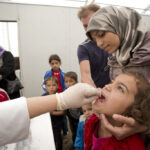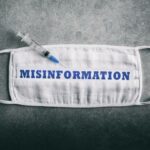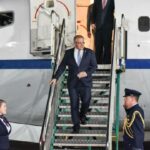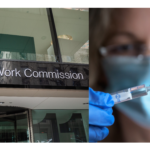Rich Nations Are Withholding Vaccines From the Poorest, Explains AFTINET’s Dr Patricia Ranald
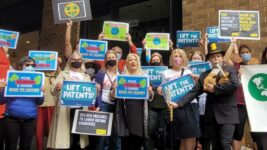
The Delta variant of COVID-19 arrived in Sydney in June. And with the onset of this more virulent strain of the virus, the race was on to vaccinate as many people as possible in order to prevent a widespread outbreak and large numbers of deaths.
However, as our nation was beginning to open up from prolonged pandemic restrictions – with the aim of getting back to “normal” – news struck a fortnight ago regarding a new variant having emerged out of southern Africa, which has been baptised Omicron.
As wealthy nations have been hurriedly vaccinating their entire populations, some of these countries have been refusing to allow the poorest nations around the globe to access the lifesaving vaccines that are recognised as preventing COVID fatalities and lowering transmission rates.
So, besides the obvious fact that this means the former colonised peoples of the Global South are being left to die, it also means that variants, like Omicron, can develop amongst these unvaccinated fellow human beings, and spread back to richer countries and perhaps even outdo vaccine efficacy.
The TRIPS waiver
Due to the emergence of Omicron, the 12th World Trade Organisation Ministerial Conference, which was scheduled for last week, had to be postponed for a second time since the pandemic began. And this meeting was the next opportunity for nations to come together and address vaccine disparities.
South Africa and India petitioned the WTO last October to pause the intellectual property (IP) rights concerning COVID vaccines, so that cheaper generic versions can be produced to allow people of the Global South to be vaccinated.
The WTO governs the rules within the 1995 Trade-Related Aspects of Intellectual Property Rights (TRIPS) agreement, which contains provisions that protect the IP rights of newly-produced vaccines with patents lasting 20 years, making it illegal for unauthorised entities to manufacture them.
The suspension of IP rights relating to COVID-19 vaccines would allow countries, like South Africa and India, that have the pre-existing infrastructure to produce low-cost vaccines that could provide the nations of the Global South with these lifesaving treatments to protect their populations.
A sunburnt country
The Australian Fair Trade and Investment Network (AFTINET) has been leading a campaign of civil society organisations that have been calling on wealthy nations, like the UK, Switzerland and Germany, to drop their blocking of the TRIPS waiver.
Australia was initially in the campaign’s sights, for refusing to support the waiver until September. Although, our nation has since sponsored a pandemic trade statement, which deals with vaccines, but makes no mention of the waiver, and AFTINET is concerned this is seen as an alternative to it.
Sydney Criminal Lawyers spoke to AFTINET convenor Dr Patricia Ranald about the vaccine situation in the Global South, the actions of Pfizer in blocking the TRIPS waiver, and the implications that simply refusing to inoculate the poorest nations on the planet has on the credibility of the WTO.
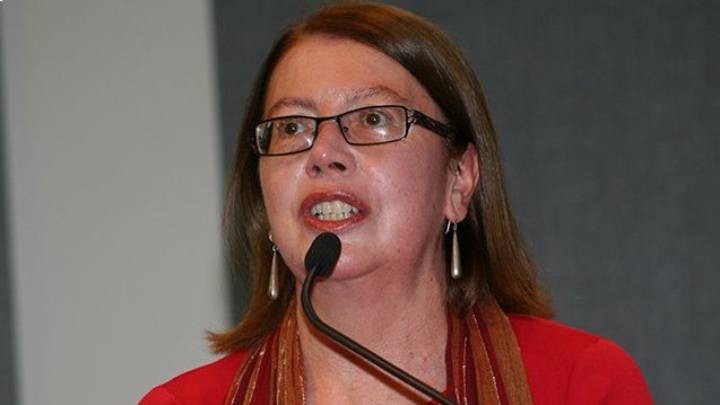
Since October 2020, the WTO TRIPS waiver has been on the table. It would involve WTO member governments agreeing to temporarily suspend 20 year patents to allow for the production of affordable vaccines for low-income countries.
In Australia, we’ve been focused on getting the local population vaccinated over the second half of 2021, which now sees around 80 percent of Australians double-jabbed.
So, Dr Ranald, what is the vaccine state of play globally? And for those countries, as in Africa, that have very low rates, what’s happening?
It’s very unequal. South Africa has called it “vaccine apartheid”. It has certainly seen very unjust distribution of vaccines globally for low-income countries.
If you look at countries, like Australia and other OECD countries, they’re reaching double vaccination rates of 80 percent and more. Yet, in Africa, the average in low-income countries is less than 7 percent, and in very poor countries, it’s 1 or 2 percent.
So, not even frontline workers are being vaccinated in those countries.
The World Health Organisation has said that the target was 40 percent of the global population by the end of this year. But it’s nowhere near that for these low-income countries.
The target for the middle of next year is 70 percent, and we’re not going to reach that either for low-income countries.
So, for many low-income countries, at the rate we’re going, it’s going to be several years before there’s double vaccination, which means millions more people will die, and more variants of the disease will develop in those areas of low vaccination because that’s where they develop.
In terms of the vaccination donations, there’s this COVAX donation facility, whereby rich countries are meant to donate vaccines to poor countries but that’s not meeting its targets either.
The estimate was that by the end of this year we needed 11 billion doses to vaccinate everyone in the world. But the COVAX target was only 2 billion, and we’ve only reached 500 million.
What’s happening with those donations is rich countries are basically donating their leftovers. But now, they’re starting to hold back because of the recommendations to have boosters and also to vaccinate young children.
So, next year, more than 11 billion doses are going to be needed to vaccinate the whole world, because 11 billion meant two doses for every adult.
But if you’re now looking at boosters and children being vaccinated, the production capacity is not there.
Greater Sydney has just opened up, but now it’s been hit with news of the new Omicron COVID-19 variant, which has emerged out of southern Africa.
How does the appearance of this new variant reflect on the refusal to move on the WTO TRIPS waiver? And how does this decision to protect COVID vaccine intellectual property rights bode for the future in this regard?
Basically, the mRNA vaccine producers, like Pfizer, have refused to share their intellectual property voluntarily, and they’re also lobbying heavily against the waiver in the World Trade Organisation.
The waiver is needed in order to vastly expand global production of vaccines. If we don’t expand global production and get it to those low-income countries, there will be more variants, because variants occur when there is a large pool of unvaccinated people.
There will be millions more people dying, and there will be more variants, like Omicron, emerging in these areas of low vaccination, which are basically low-income countries.
We must expand global production through having a waiver on TRIPS rules to address this problem.
As you’ve mentioned, booster shots are now being administered in this country, whilst they’ve been available in the US for some time now.
WHO director general Tedros Adhanom Ghebreyesus has long been calling for a halt to moves to administer booster shots in rich nations and rather act on prioritising the inoculation of the Global South.
How do you consider the move to administer booster shots in the nations that can afford it? And wouldn’t the WHO’s proposed direction have lessened the likelihood of the need for boosters?
That’s right. If we had followed the WHO plan from the beginning and shared the vaccine knowledge, and expanded global production, we would now be in a position to have higher rates of vaccinations in all countries and then consider boosters.
We still have to plan for vastly increased production because of the emerging need for boosters.
The thing is boosters are going to be needed in low-income, as well as high-income, countries now, so we really must have the waiver, that’s the only way to do it.
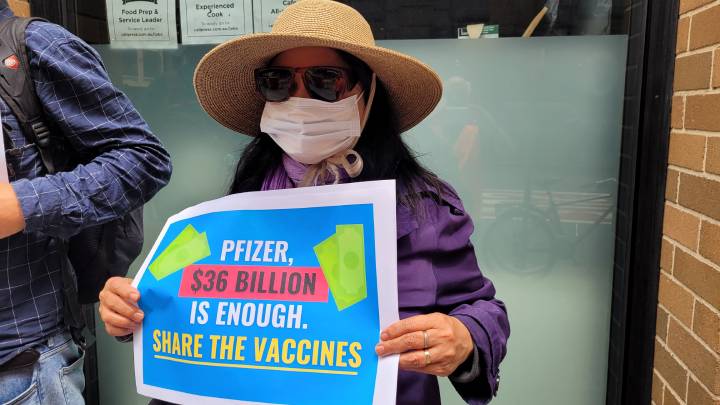
You recently published an article in Michael West Media, calling out the way in which Pfizer, one of the major companies involved in COVID vaccine production, has been attempting to block the patents waiver.
Yet, it looks likely Pfizer has pulled in $36 billion in vaccine revenue this year.
What has its response to the waiver proposal been? And what does it have to lose here, considering it’s not making any money out of sales to the poorest nations as it is?
The fact that Pfizer is predicting $36 billion in vaccine income for this year shows that they have been making super profits from selling the vaccines.
The waiver would not mean they get no income from selling vaccines, it would mean they get a lower income.
They’re simply protecting a monopoly right to make super profits, and they’re doing this by lobbying governments in an institution, the World Trade Organisation, which claims to be about free trade and competition, not about protecting monopolies.
In the context of a pandemic, the normal rules about patents and other forms of intellectual property should not apply.
But Pfizer has said it has been lobbying very strongly against the waiver. It’s been lobbying countries like Germany, Switzerland and the UK, which are the three main governments blocking the waiver in the WTO.
Pfizer is behaving disgracefully in protecting super profits in a context where millions of people are dying and there will be more variants, like Omicron, developing unless we increase global production and get vaccines into low-income countries.
One hundred WTO member governments, including the US and Australia, have supported the TRIPS waiver. Many Australians have been shocked to find that our government held out on supporting it until September.
In your opinion, what are the broader implications of the richest countries refusing to allow the poorest nations to protect their citizens from a deadly virus during a global health crisis?
It shows that the structure of the WTO still allows a minority of countries the ability to block what is the wish of the majority of not only governments, but most people in the world to actually address their needs in the time of a pandemic when millions are dying.
Unless this is solved it will be a massive failure of the WTO to not be able to change its rules to address a global pandemic, which it could do if there was the political will to do so.
It does throw a big question mark over the validity of the WTO if it can’t solve this problem.
The negotiations are ongoing. The fact that the WTO Ministerial Meeting has been postponed does not mean that there are no negotiations.
The TRIPS council is still meeting online, and, in fact, there are two more meetings scheduled, one for 10 December and the other for 16 December.
And there is a massive push from civil society to persuade those governments, like the German, the Swiss and in the UK, to change their positions.
And lastly, Dr Ranald, AFTINET’s been pushing for the TRIPS waiver since the very beginning. Do you expect we’ll eventually see movement on it?
We’ve been working with our member organisations, like the Public Health Association, but also with broader groups who haven’t normally been involved in trade debates, like Amnesty International and Médecins Sans Frontières. They’ve been taking a lead role.
We’ve all been working together on this, as have a number of aid and development organisations.
I still have hope that the massive pressure from both the developing countries within the WTO and the civil society organisations around the world will have some impact on the debates that are still happening in the WTO, as I said the TRIPS Council is meeting in December.
In some ways the new variant has increased the pressure on the WTO to make the decision because it’s quite ironic that the reason the WTO meeting had to be postponed is because the delegates from Africa were not allowed to travel to Europe because of the Omicron variant.
So, the very body that’s supposed to make the decisions to open up global vaccine production couldn’t have that particular meeting because of yet another variant that’s developed. So, there’s additional pressure on the WTO.
Also, the other thing is, US president Joe Biden said on the day that the Omicron variant was identified, that this should give impetus for the decision on the waiver for the WTO.


